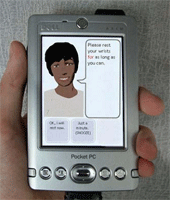Expressivity vs. Empathic Accuracy in Automated Comforting by Relational Agents
|
Timothy Bickmore & Daniel Schulman
Computer and Information Sciences, Northeastern University
Thursday October 5, 2006 1:30 PM to 2:15 PM 164 WVH
Interactions in which computer agents express empathy for users have been shown to be important in alleviating user frustration and increasing user liking of the agent, and may have important healthcare applications. Given the current state of technology, designers of these systems are forced to choose between (a) allowing users to freely express their feelings, but having the agents provide imperfect empathic responses, or (b) greatly restricting how users can express themselves, but having the agents provide very accurate empathic feedback. This study investigates which of these options leads to better outcomes, in terms of comforting users and increasing user-agent social bonds. Results, on almost all measures, indicate that empathic accuracy is more important than user expressivity. See more |  |
Time for a Wrist Rest! - Task Interruption and Health Regimen Adherence
|
Timothy Bickmore, Daniel Mauer, Francisco Crespo, Thomas Brown
Computer and Information Sciences, Northeastern University
Thursday October 5, 2006 2:15 PM to 3 PM 164 WVH
Cueing strategies, such as real-time reminders, are among the most effective methods of prompting individuals to perform healthy behaviors such as taking their medication and exercising. However, these reminders often represent a task interruption for users who are engaged in work activities. This paper presents the results of two studies which explore strategies for interrupting users at work to perform a healthy behavior, in which the primary outcome of interest is long-term adherence to a desired health behavior change regimen. We find that the degree of perceived politeness of interruptions is positively correlated with predicted long-term adherence, but negatively correlated with short-term compliance. We also find that, among several interruption coordination strategies previously explored in the literature, empathic interruptions are overall superior in gaining both short-term compliance and long-term adherence. See more |  |
